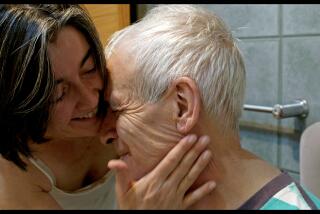In the Mind’s Eye? : Battle Rages Over Whether Repressed Memories Are a Key to Long-Forgotten Evils or a Pandora’s Box of False Accusations
TORONTO — A young Texas woman decides to seek psychological counseling for bulimia. A therapist tells her that her real problem is something else: She was burying memories of childhood sexual abuse.
Nonsense, say opponents of “repressed memory” syndrome. Not only are claims of repressed memory of childhood abuse almost never corroborated, but unconditional acceptance of these claims is ripping apart thousands of families, they contend.
But an equally vocal contingent of experts in memory and mental health say repressed memory is an authentic psychological phenomenon that is common among adult survivors of childhood abuse.
In the few years since the idea of repressed memory first captured public attention--in the form of several sensational criminal trials and lawsuits--the concept has deeply polarized mental health experts. This was evidenced this week at the annual American Psychological Assn. in Toronto, where the bulimic woman’s case was used to illustrate repressed memory syndrome.
Advocates for both sides “are getting more bitter and more vitriolic. They are calling each other names now,” said Denver attorney Harry N. MacLean, who attended the meeting. “If you doubt the validity of these memories, you call people who believe them ‘true believers.’ The ‘true believers’ will say that those who raise questions about the truthfulness of repressed memories are perpetrators themselves or are covering up for perpetrators.”
MacLean is the author of a new book--”Once Upon a Time: A True Story of Memory, Murder, and the Law”--on the case that catapulted the concept of repressed memory into public discussion. Eileen Franklin-Lipsker testified in 1989 that she witnessed her father murder her best friend in San Mateo 20 years earlier, but had repressed the memory until adulthood. George Franklin was convicted based on his daughter’s testimony and remains in prison.
*
At several APA sessions on the topic, speakers were moved to larger rooms to accommodate overflow crowds, and spectators (mostly psychologists) routinely applauded, gasped, sighed, booed and hissed at the comments of several well-known and respected speakers.
“This debate is phenomenal,” said APA president Frank Farley, who organized a session that pitted opposing forces. “I don’t know of any other issue where you have science and (the therapeutic) practice coming into such conflict.”
Those who support the theory--often clinical therapists--say that it is common for people to “dissociate” from bad memories to avoid the pain.
But University of Washington researcher Elizabeth Loftus, an experimental psychologist, and others contend that there is no scientific evidence that long-forgotten memories can be suddenly remembered.
Many therapists say they don’t know who or what to believe. Like prosecutors, defense attorneys and judges, therapists are struggling over whether repressed memories should be admitted in court as evidence.
“The science is incredibly soft. There is very little that is concretely understood about memory, and even less about traumatic memory,” MacLean said.
*
An even larger issue for therapists is whether they should attempt to elicit repressed memories from patients they believe may have been abused as children.
What therapists eventually believe about this, Farley said, “will impact thousands and thousands of people.”
Loftus, who does not treat patients, said she does not dispute that many individuals are abused as children--and that many try to avoid the memory as adults. But “there is little evidence that memories can be completely banished from awareness, then recalled in pristine detail. That’s what I do not see very solid support for.”
Until such evidence is uncovered, Loftus said she fears that some therapists will fish for memories of abuse, leading people like “Laura”--the Texas woman”--to begin believing in false memories. (After four years, Laura recanted the charge that she had been an incest victim and blamed her therapist for implanting false memories.)
Loftus criticized a small number of therapists who, she contends, use hypnosis, memory-enhancing drugs or suggestive questioning to probe for memories that may not exist.
“If the patient cannot remember the abuse, some therapists will work with the patient until they do. This even happens to patients who enter therapy thinking they had relatively happy childhoods,” Loftus charged. “Even if it’s a small fraction of therapists doing this. . .you end up with a pretty large number of people with false memories.”
*
In response to accusations resulting in lawsuits, a group called the False Memory Syndrome Foundation has been formed in Philadelphia to help accused families defend themselves. The organization claims to have 5,000 members.
But many therapists disagree profoundly with Loftus’ position. According to USC psychologist John Briere, it’s common for people to repress memories. And, the worse the memories, the more likely people are to do this.
“The mind does this because we don’t want to feel bad,” said Briere, who debated Loftus at the APA meeting in what is becoming a series of public confrontations between the two. “It may start with not letting yourself think about something and it may eventually evolve into not allowing yourself to remember.”
Loftus said that memories become murky, distorted and cannot be pulled back in their original form.
In an attempt to prove this, Loftus has completed several experiments showing how researchers could easily implant false memories in unsuspecting people.
But, Briere noted, Loftus and other researchers cannot implant traumatic reasons in their guinea pigs for ethical reasons.
“Yes, memories can be implanted. But that’s not the point,” said Briere, who is well known for his treatment of people who have been sexually abused. “It’s the trauma that relates to not remembering.”
The recall of repressed memory is not sudden or trivial, he said. “The mind touches and pulls back, touches and pulls back. The process of remembering is a slow, painful, arduous process.”
But Briere acknowledged that there is little scientific proof supporting this explanation.
“Anything I say is just anecdotal.” Yet, he added, “To say that it’s all confabulations and delusions and coercive goes against the daily experience I see in my office.”
In a recent study of 450 people who reported sexual abuse histories, 59% said they had forgotten the abuse for some period of time, Briere said.
*
While Loftus urged therapists at the meeting to search hard to prove a patient’s claims of repressed memory, Briere said that corroboration is often impossible because the abuse takes place in secrecy and shame. Few child victims tell anyone about the abuse when it’s happening, he said.
But almost everyone involved in the controversy agrees on one thing: The controversy may make it tougher to identify authentic cases of child abuse and to pursue the perpetrators.
“There is tremendous fear that by raising the question of whether a memory could be false, we will set back the clocks to a time when women and children who tried to say that they were abused were ignored or made to feel that they were to blame for the abuse,” said Pamela Freyd, executive director of the False Memory Syndrome Foundation.
According to Farley, the APA will come up with a report on repressed memory later this year to help clarify many of the confusing issues.
They Say They Remember
In recent years, numerous claims of repressed memory syndrome have surfaced. Among them:
* Marilyn Van Derbur Atler, of Colorado, who won the Miss America title in 1958, says she was sexually molested from age 5 to 18 by her socially prominent father, who is now dead. Atler said she repressed those memories until they were jarred at age 24 by a minister who suspected that she had been abused.
* Frank Fitzpatrick, a Cranston, R.I. private investigator, started remembering that he had been sexually molested by a parish priest at age 12. In December, the Diocese of Fall River (Mass.) reached a settlement with attorneys for 68 men and women who say they were abused by former priest James R. Porter.
* Actress Roseanne Arnold claims both parents abused her as a child, memories that she says stayed buried for three decades. Her parents, Jerry and Helen Barr, have denied the allegations.
More to Read
Sign up for Essential California
The most important California stories and recommendations in your inbox every morning.
You may occasionally receive promotional content from the Los Angeles Times.










